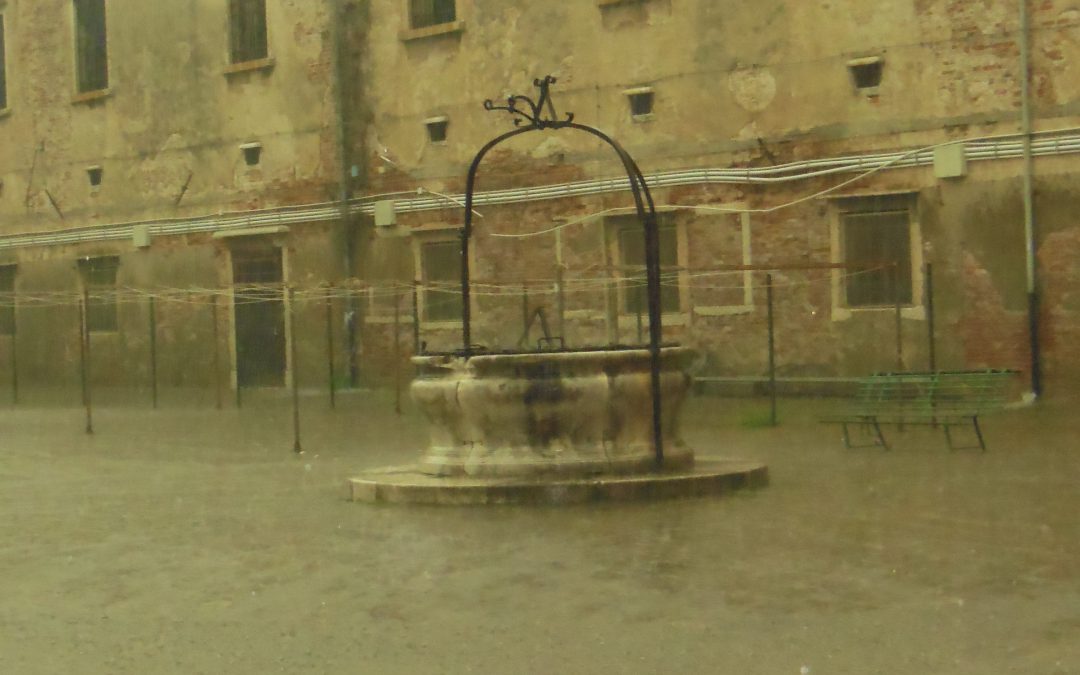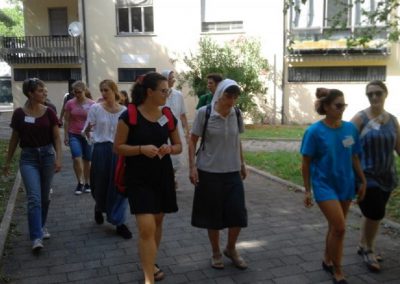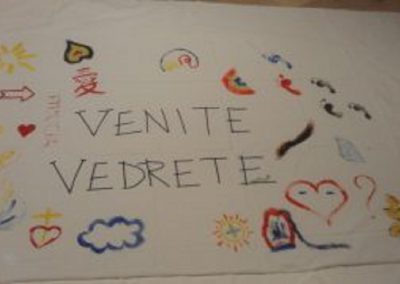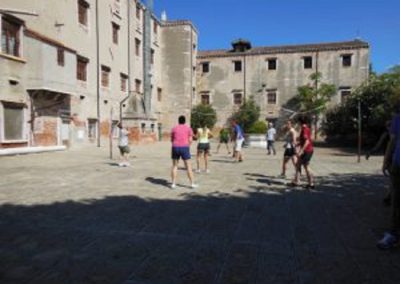This article describes some echoes of the experience lived last summer by a group of young people who were trained to active charity at the «Giudecca» prison in Venice. Their words remind us that
every boy’s or girl’s heart is longing for a beautiful life. We are entrusted, with the task to capture young people’s hearts, not to be afraid to make them service proposals, being their companions and
guides along their life path.
Here below are the glimpses of their experiences.
We had to make a great effort to enter such a complex world, where the prisoner’s perspectives
often clash with the prison police’s approach, with the judge’s opinion, with the prison direction’s policy, as well as with educators’ and volunteers’ set of mind. The nuance that was immediately
recognizable was that, first of all, the prisoners were all women. In spite of it, after the first day we spent with them, various problems each of them had encountered in their mutual relationship became evident: thoughts and expectations that volunteers and even more of female prisoners had instituted a cold distance that hindered each other to feel truly welcomed. This is only the beginning of this adventure: icebreaking was necessary. In the mornings a prayer time, as well as a training, was dedicated to us. The first reality we got to know is the one reported by Ornella Favero, director of the newspaper of the prison of Padova «Ristretti Orizzonti» and also president of Italian Conference of Justice Volunteers. As she herself told us, prison’s regulations foresee that social institutions could enter the prison to promote re-education activity, in order to avoid the prison environment from turning into a closed setting, therefore, a crime school. If these pathways are not present, because of the great amount of bureaucracy and the lack of funds, the incredible happens: prisoners feel oppressed. Within this situation, volunteers are indispensable resources who convey new energies to prison. Ornella’s final message asks us, therefore, to adopt a wider look, so that personal security doesn’t only lead to the culprit’s imprisonment, but also to a pathway providing him/her useful instruments for future reinsertion into society. Meditating on Ornella’s thoughts, a volunteer friend, Anna, shared this reflection: «Meeting female prisoners has disarmed me. Remaining ‘without weapons’ caused me fear, insecurity and a great sense of inadequacy. Suddenly, I rediscovered my strength precisely in being so weak and without a shield, as I felt I didn’t need to defend myself, I felt I wasn’t alone». Ornella’s words then acquired new force: «I didn’t choose good, it just came to me. Without any armour».
In Bartolomea Capitanio’s footsteps, each one of us must acknowledge that evil exists in us; for this reason, it is important to acquire a humble look upon oneself, which knows how to glimpse the need for love, for freedom, but above all the desire to start all over again and to do something for the other. Besides, one can understand that the context where one grows up, some parent’s choices and other external factors can heavily impact people’s life, reducing their potential and achievement capability. Therefore, it can happen that a ‘normal’ individual, exasperated by wearing family situations, can accomplish something unbelievable. More commonly, it can happen to everyone to ‘mow down victims’, by words, deeds, omissions and thoughts. In his letter to the Romans, St Paul says: «And really, I know of nothing good living in me – in my natural self, that is – for though the will to do what is good is in me, the power to do it is not». We thus reach the stage at which we all recognize ourselves as sinners. The origin of evil has always been debated: while in the past it could be considered a divine punishment, nowadays the error lies in being totally accustomed to it, not recognizing its violence and cruelty, anaesthetizing our sensibility and humanity. This phenomenon can be clearly perceived on the Internet, where you can read harsh and lacerating comments against every sort of weakness and poverty. In order to put a right brake on this hatred, it is necessary to regenerate and sharpen the conscience of anyone who keeps in himself the sense of truth, of shame, of good: you can contrast the ‘enemy’ sowing discord at night only this way.
Our pathway was then enriched by other meetings, such as the testimony of the director of Padua and «Giudecca» district prison and the judge Vincenzo Sgubbi’s words. Educators Marta and Carlotta described to us the approaching effort to the female prisoners and the humanitarian impulse characterizing their work, made overelaborate, however, by bureaucracy. Salvatore, a prison police agent, also highlighted the psychological burden accumulated during the week, which requires external support and help. We made a last significant encounter with the «Pink Lioness» group in which women do rehabilitation after a mastectomy, by a team sport: row on a dragon boat along the Venetian Canals. Spending the day with them, we perceived their determination, their close relationships, their desire to restart a new life staying side by side: these factors support them. Composing the pieces of this complex puzzle, you must not only focus on the sentence that must be expiated according to the law, but rather on instruments, on encounter pathways and on mediation ways creating contacts between culprits and society, offering them the chance to be truly reborn again. These ways are discovered in silence; they follow slow rhythms and require big efforts: they are the exact opposite of slogans and newspaper headlines that sometimes summarize complicated topics in a few lines.
The well is always the symbol of encounter in the Bible: the fact that in the middle of the «Giudecca» prison there is a well to represent the longing for a relationship, is for us highly symbolical.
On our return home we, young people, want to continue the journey, taking care of our neighbour, whoever he/she may be, according to the example of the good Samaritan. On behalf of all, I would like to thank in a special way the witnesses who have offered us precious richness; a special thanks to Fr Lorenzo, Fr Luca and Fr Nilo, to the community of the sisters of Maria Bambina in Venice, in a particular way to Sr. Chiara, Sr. Franca, Sr. Monia who accompanied us in this experience. We dedicate an important thanks to Lucia for her indispensable support, to Antonio and Caterina for their precious daily help, to Tiziana and Fabrizio for their availability and to Milva for her great support, for the company and for having shared with us her story.
Chiara and Michele




